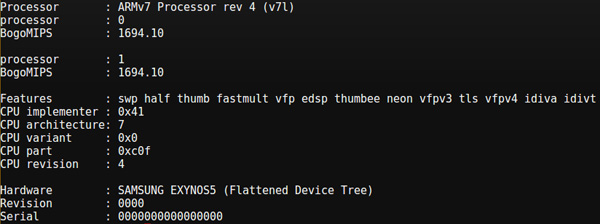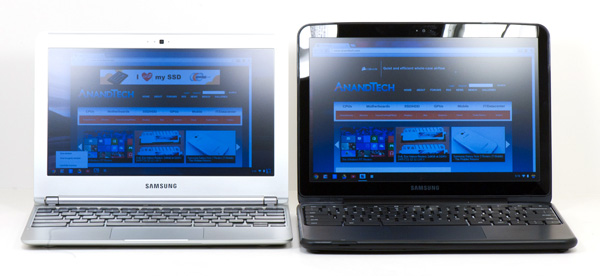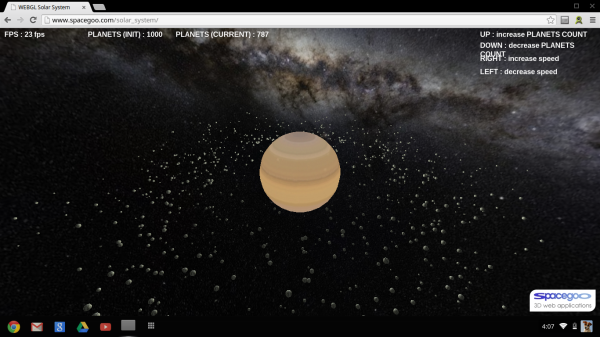Samsung Chromebook (XE303) Review: Testing ARM's Cortex A15
by Anand Lal Shimpi on October 31, 2012 9:00 AM ESTPerformance: Atom vs. ARM's Cortex A15
In our iPhone 5 review I included this crude diagram comparing the high level micro-architecture layouts of the current crop of mobile CPU cores. While most of the cores looked fairly similar, the one to really stand out is ARM's Cortex A15. A three issue, OoO core, the Cortex A15 was designed to put ARM in a completely new performance category.

For 2013, the Cortex A15 is expected to be the ARM CPU core of choice for the next wave of smartphone and tablet SoCs. NVIDIA's Wayne should integrate multiple Cortex A15s as well as competing solutions from Samsung and TI. Samsung's Exynos 5 Dual, found in the new Chromebook, integrates two ARM Cortex A15 cores running at 1.7GHz. As our first experience with a Cortex A15, I wanted to get a good idea for how it would compare to Intel's Atom. And now me comparing to the older Chromebook 500 makes sense. The Atom N570 in the older Chromebook is the closest approximation we have to the currently shipping Atom based mobile SoCs. There are a number of enhancements to the newer chips (particularly when it comes to power consumption), but the base core is very similar. It's clear that the Sandy Bridge Celeron based Chromebook is faster than this new Cortex A15 design, but how about the old dual-core Atom model?

As Chrome OS is built around the Chrome browser, our tests had to be largely JavaScript based unfortunately. The good news is that even given the nature of the benchmarks, we're able to get a good feel for performance between the two SoC platforms. Both systems were running the latest version of Chrome OS at the time of publishing.
| Samsung Chromebook Performance Comparison | ||||||
| SunSpider 0.9.1 | BrowserMark | RIABench Focus Tests | Kraken | |||
| Atom N570 1.66GHz | 1034.3 ms | 152780 | 1968 ms | 14229.5 ms | ||
| Exynos 5 Dual 1.7GHz | 690.5 ms | 217031 | 1192 ms | 9733.2 ms | ||
The Cortex A15 is fast. Across the board we're seeing a 40 - 65% increase in performance over a dual-core Atom. Although it's not clear how performance will be impacted as companies work to stick Cortex A15 based SoCs in smartphones with tighter power/thermal budgets, in notebooks (and perhaps even tablets) the Cortex A15 looks capable of delivering a good 1 - 2 generation boost over Intel's original Atom core.
The IE10 browser tests tend to agree with our JavaScript performance tests, although the CSS Maze Solver benchmark shows a huge advantage for ARM over Intel's Atom here.
| Samsung Chromebook Performance Comparison | ||||||
| IE10 Bubbles Test | IE10 Fishbowl | IE10 Maze Solver | ||||
| Atom N570 1.66GHz | 11 fps | 5 fps | 45 seconds | |||
| Exynos 5 Dual 1.7GHz | 17 fps | 8 fps | 17 seconds | |||
GPU performance is an even bigger advantage for the Exynos 5 Dual over Intel's old Atom N570 (GMA-3150 GPU). I ran three different webGL tests, each of which showed just how bad the old Atom GPU core was.
| Samsung Chromebook GPU Performance Comparison | ||||||
| WebGL Solar System | WebGL Cubes (500) | WebGL Aquarium (50) | ||||
| Atom N570 1.66GHz | 2 fps | 10 fps | 2 fps | |||
| Exynos 5 Dual 1.7GHz | 22 fps | 28 fps | 38 fps | |||
This comparison isn't really all that fair as the newer Atom cores use Imagination GPUs, although even then they are using relatively underpowered solutions compared to what Samsung is shipping on the Exynos 5 Dual.
The more relevant conclusions here apply to the CPU comparison. Next year Intel is expected to introduce its first new Atom core since the platform's introduction five years ago. The new architecture will bring an Out of Order execution core as well as a tangible performance increase. The question is whether or not this will be enough to fend off advances from Cortex A15 based designs.

The new Chromebook (left) vs. the old Atom based Chromebook (right)
In our Surface review I looked at Clovertrail Windows 8 tablet performance and put it a good 40%+ faster than NVIDIA's Tegra 3. If ARM's Cortex A15 is able to outperform Clovertrail by a similar margin, it could make the next generation of Windows RT tablets even more attractive. Keep in mind that we're looking at an older Atom platform here and not Clovertrail, so the performance deltas could shrink a bit.











149 Comments
View All Comments
eddman - Thursday, November 1, 2012 - link
What your comment has to do with what I wrote?! I never mentioned anything about smartphones.I just pointed out that you cannot compare an old 45nm chip with a brand new 32nm one, consumption wise.
Then again, just because we haven't seen clover trail on smartphones, doesn't mean it consumes too much power.
Hulk - Wednesday, October 31, 2012 - link
Good quality IPS screen on my next laptop or I stay with my Dell 640m forever.Put a SSD in it recently and I'm totally fine with it.
slackpenguin - Wednesday, October 31, 2012 - link
I keep reading these comments on reviews for this device like "wouldn't some other device be a better value for $250?"How many of you actually go and buy $250 used clunker laptops and are overjoyed with the "value" you just picked up over a 2.5 lb, 0.8 inch, fanless laptop with a warranty?
I haven't seen $250 laptops that come with any "advantage" of a "proper OS". New $250 laptops almost always come with Windows 7 Starter. Used, almost always blank or Windows XP Home. They inevitably either weigh 6 lbs or run a dog slow Atom with 1GB RAM and a 4200 or 5400 rpm drive that is soundly beat by this new Exynos chip setup.
Granted, you can upgrade most any of these clumsy $250 devices talked about for another $40 as Microsoft is desperate for you to use tiles instead of a start menu.
It sounds like most of these comments are from people who would see value in the "Homer Car" over one of those Smart cars. There are plenty of devices out there for you people. This "value" comment is just getting annoyingly repetitive.
eddman - Wednesday, October 31, 2012 - link
You are right about the 250$ range, but with a little more you can get some good stuff.http://www.bestbuy.com/site/Asus+-+14%26%2334%3B+L...
http://www.bestbuy.com/site/Asus+-+15.6%26%2334%3B...
TrackSmart - Wednesday, October 31, 2012 - link
Anand,Why not add a few words comparing this to a standard netbook? $250 sounds like a unique price class, until you hop on Newegg and see that netbooks can be had for similar prices. Here's an 11.6" model for $278 that runs an AMD C60 CPU, 4GB RAM, and 320GB HDD: http://www.newegg.com/Product/Product.aspx?Item=N8...
Key questions worth addressing in the article:
1) Is the Chrome user-experience dramatically better than running Windows on a low-end processor? [Particularly the more efficient Windows 8 platform.]
2) Do the advantages of a lightweight operating system really outweigh the lack of versatility compared to a full-blown OS?
3) Many of us have purchased netbooks as replacements of our parents ancient laptops. Does this Chromebook do a better job than netbooks at meeting basic computing needs?
Krysto - Thursday, November 1, 2012 - link
Yes it is, and Windows 8 is not that much more efficient than Windows 7. Maybe 5% more efficient.TrackSmart - Thursday, November 1, 2012 - link
To clarify, this isn't a "yes" or "no" question that I wanted an answer to. The "answer" depends on your computing needs and what you can afford.I have my own general answers. For my purposes, the Chrome OS is too limited for what I want to do with a laptop-like device. The *concept* of a lightweight operating system that can run on low-end hardware is fantastic. However, the Chrome OS ecosystem is still lacking in features and software availability. Microsoft's RT operating system sounds like it is getting closer to this goal, at least if Anandtech's review is to be believed. We'll have to see if 3rd party software appears to round-out the ecosystem. And the price is still $600 if you want the keyboard cover, so out of this sub-$300 discussion.
On the other hand, a Windows-based netbook can run all of the software I need, but painfully slowly. It's the reason I don't own a netbook and chose to spend more than $300. But if $300 is all you have to spend, and you need something portable that runs all of your productivity software, an 11.6" netbook might be better for you than a Chromebook.
karasaj - Wednesday, October 31, 2012 - link
Does anybody notice that A15 pretty much beats the Z2760 from the Surface review hands down in every way?If only Surface RT had that. But then again that might say just as much about IE versus chrome.
alvinchim - Wednesday, October 31, 2012 - link
Anand: How fast does this boot up? Is it like a smartphone/tablet, instantaneous? Is it like an apple ssd/os, pretty quick? Or like a window 7 SSD watch the screens go by? Or like a windows xp/hd x 7 years old, you might as well sort the laundry, text your girlfriend, and brush your teeth boot? That's a big question, because this really is like a tablet with a keyboard and a bad screen.slackpenguin - Wednesday, October 31, 2012 - link
I keep seeing figures of 10 seconds cold boot, 2 seconds from sleep mode, and 3 seconds off.